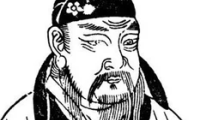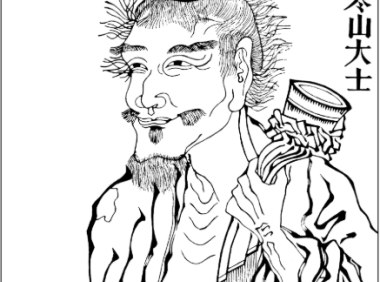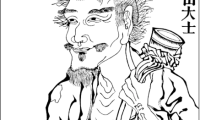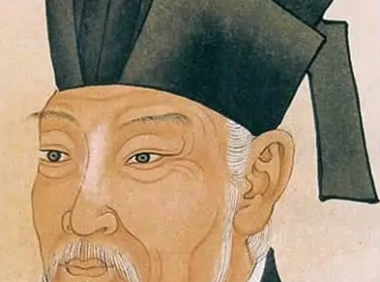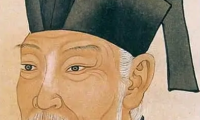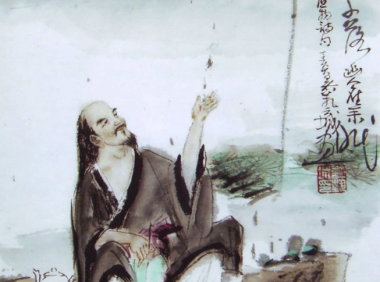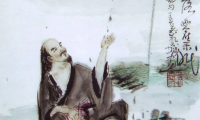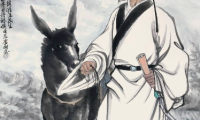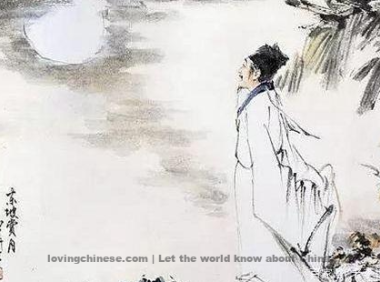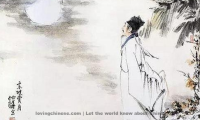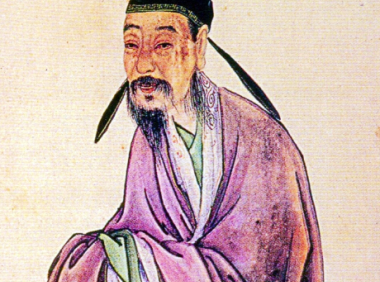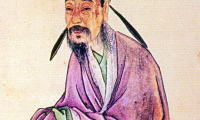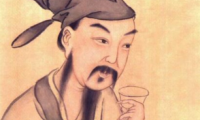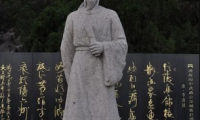-
Zu Yong: Nostalgia on Southern Rivershore ~ 《江南旅情》 祖咏 with English Translations
This is a five-character poem by the Tang Dynasty poet Zu Yong. The scenery of the south of the Yangtze River in the work is an image of scenery. The poet mainly uses details to express his longing for his hometown and his concern for his neighbors. The beautiful scenery seen during the trip is certainly not bad, but the longing for his hometown in his heart is also expressed very earnestly. 唐朝诗人祖咏的五言诗。作品里江南景色是一种意象中的景色,诗人主要用细节刻画表现对家乡的思念,对乡邻的牵挂,旅行中见到的优美景色固然不俗,但心中对故乡的思念之情也表露得很殷切。 《江南旅情》 祖咏 楚山不可及,归路但萧条。海色晴看雨,江声夜听潮。剑留南斗近,书寄北风遥。为报空潭橘,无媒寄洛桥。 Nostalgia on Southern Rivershore Zu Yong Endless stretch Southern hill on hill;My homeward way is dreary still.Clouds on the sea foretell the rain;Tide brings at night the stream's refrain.My sword shines under Southern Star;North wind won't bring word from afar.Poolside tangerine's sweet in vain.Who will send them to Northern plain?...
- 0
- 0
- 68
-
Li Xun: Tune: Buddhist Dancers ~ 李珣·《菩萨蛮·回塘风起》 with English Translations
This poem describes a woman's nameless longing. In the previous film, the environment where the woman is located is depicted, and the phrase 'flying partridges in pairs' is used to inspire the next film. The next film depicts a woman's love for "Where to Sail", with shallow language and deep emotions, and a clear voice. 这首词写一女子的无名相思。上片写女子所在的环境,用“双双飞鹧鸪”一句兴起下片。下片写女子对“征帆何处客”的爱恋,语浅情深,清音有余。 李珣·《菩萨蛮·回塘风起》 回塘风起波文细, 刺桐花里门斜闭。 残日照平芜, 双双飞鹧鸪。 征帆何处客, 相见还相隔。 不语欲魂销, 望中烟水遥。 Tune: Buddhist Dancers Li Xun The pool is wrinkled by the rising breeze; The door is closed against blooming plane trees. The plain drowned in setting sunlight, A pair of partridges swift in flight. Where is her roamer’s sail? She longs for him to no avail. Silent with broken heart in dream, Awake, she sees but misty stream....
- 0
- 0
- 58
-
I Step Forward But Hold My Tongue by Hanshan ~ 寒山·《花上黄莺子》 with English Translations
寒山:唐代著名高僧,长住天台山客岩幽窟中。与拾得、丰干皆隐栖天台山国清寺,故称“国清三隐”。寒山好峰谤唱偈,每有篇句,即题于石间树上。寥山诗有鲜明的乐府民歌风,通俗易懂,机趣昂然,多作佛门警世语。全唐诗汇编成《寒山子诗阜》一卷,收录诗歌三百余首。 Hanshan: a famous Tang Dynasty monk who resided in the secluded caves of Ke Yan on Tiantai Mountain. Along with Shide and Fenggan, they both reside in Guoqing Temple on Tiantai Mountain, hence the name "Guoqing San Yin". Hanshan Haofeng slanders and sings verses, with each sentence inscribed on a tree among the rocks. The poetry of Liaoshan has a distinct style of Yuefu folk songs, which are easy to understand and full of humor, often used as Buddhist warning messages. The entire collection of Tang poems has been compiled into a volume called "Hanshanzi Poetry Collection", which includes more than 300 poems. 寒山·《花上黄莺子》 花上黄莺子,关关声可怜。 美人颜似玉,对此弄鸣弦。 玩之能不足,眷恋在龆年。 花飞鸟亦散,洒泪秋风前。 I Step Forward But Hold My Tongue Hovering over the spring flowers, A golden oriole trills its aubade. Nearby, a lovely girl, jade-complected, replies, Her fingers lingering on the zither's strings. She would play forever, she believes: Such are the love-thoughts of her spring years. But let the petals wither: farewell oriole, And then, how cold the wind, the tears. (Peter Stambler 译) Above the blossoms sing the orioles: Kuan kuan, their dear notes. The girl with a face like jade Strums to them on her lute. Never does she tire…...
- 0
- 0
- 68
-
白居易《寒闺怨》 – Bai Juyi English Translations – Chinese Poems
Bai Juyi 寒闺怨 寒月沉沉洞房静, 真珠[1]帘外梧桐影。 秋霜欲下手先知, 灯底裁缝剪刀冷。 唐代的府兵制规定:兵士自备衣装,衣服破损,要由家中寄来补充更换,特别是御寒的冬衣。诗中第一句的“洞房”指的是房屋后部女眷的居室。居所本已深邃,寒月一照,更见幽静;帘外梧桐投影,更见阴沉。室内的妻子正在灯下为远戍不归的征夫缝制寒衣,一摸剪刀,立刻感到秋凉;再想到远在边地受寒的丈夫,怎能不牵肠挂肚呢?全诗不言怨而怨自见,流露出作者对征夫怨妇的同情。 注释: [1]真珠:珍珠。 A Wife’s Grief in Autumn The cool moon shivers over her bower tranquil, Outside the pearly screen the shadow of a parasol old. Before autumn frost falls her fingers feel the chill, When she cuts clothes by lamplight with scissors cold....
- 0
- 0
- 23
-
白居易《春题湖上》 – Bai Juyi English Translations – Chinese Poems
Bai Juyi 春题湖上 湖上春来似画图, 乱峰[1]围绕水平铺。 松排山面千重翠, 月点波心一颗珠。 碧毯线头[2]抽早稻, 青罗裙带展新蒲。 未能抛得杭州去, 一半勾留[3]是此湖。 这首诗作于公元824年春天,作者杭州刺史任期将满之时。第一句是总评。第二句说西湖三面环山,峰峦错落,湖水平静地铺展在群山之间。第三句说山上松树成排,重峦叠翠。第四句说月亮映在湖心,好像一颗珍珠。第五句说早稻长满株行距,绿油油的一片,犹如绿色的地毯。第六句说新长出的嫩绿细长的蒲叶,就像罗裙的青带子一样迎风飘动。最后两句说诗人舍不得离开杭州,一半原因是为了西湖,可见作者对杭州西湖的情深意长。 注释: [1]乱峰:参差错乱的山峰。 [2]线头:此处指地毯上的绒毛。 [3]勾留:留恋,不舍。 The Lake in Spring What a charming picture when spring comes to the lake! Amid the rugged peaks water’s smooth without a break. Hills upon hills are green with thousands of pine trees, The moon looks like a pearl swimming in waves with ease. Like a green carpet early paddy fields undulate, New rushes spread out as silk girdle fascinate. From fair Hangzhou I cannot tear myself away, On half my heart this lake holds an alluring sway....
- 0
- 0
- 21
-
Wei Yingwu: Mr. Li In the Capital As a Low-Level Recorder
Wei Yingwu Mr. Li in the Capital As a Low-Level Recorder 燕李录事 与 君 十 五 侍 皇 闱晓 拂 炉 烟 上 赤 墀。花 开 汉 苑 经 过 外雪 下 骊 山 沐 浴 时。 近 臣 零 落 今 犹 在仙 驾 飘 飘 不 可 期。此 日 相 逢 思 旧 日一 杯 成 喜 亦 成 悲 Yan Li Lu Shi Yu jun shi wu shi huang weiXiao fu lu yan shang chi chi.Hua kai han yuan jing guo waiXue xia li shan mu yu shi. Jin chen ling luo jin you zaiXian jia piao piao bu ke qi.Ci ri xiang feng si jiu riYi bei cheng xi yi cheng bei. Mr. Li, In the Capital As a Low-Level Recorder Age fifteen, gave you some poems while in the imperial compoundAt dawn, tend to incense burners, smoke rises over the red steps.Blossoms open in old Han gardens, as we go through this placeSnow falls, season to go to Mt. Li and the hot springs. Near imperial officials, today only a few remainEmperor now an immortal being, cannot wait on him any more.Today we meet each other again, talk and long for the old…...
- 0
- 0
- 11
-
Du Fu: Newlyweds Departure
dufu Newlyweds Departure 新婚别 兔 丝 附 蓬 麻引 蔓 故 不 长。嫁 女 与 征 夫不 如 弃 路 旁。 结 发 为 妻 子席 不 暖 君 床。暮 婚 晨 告 别无 乃 太 匆 忙? 君 行 虽 不 远守 边 赴 河 阳妾 身 未 分 明何 以 拜 姑 嫜 ? 父 母 养 我 时日 夜 令 我 藏。生 奴 有 所 归鸡 狗 亦 得 将。 君 今 往 死 地沉 痛 迫 中 肠。誓 欲 随 君 去形 势 反 苍 黄。 勿 为 新 婚 念努 力 事 戎 行妇 人 在 军 中兵 气 恐 不 扬。 自 嗟 贫 家 奴久 致 罗 襦 裳。罗 襦 不 复 施对 君 洗 红 妆。 仰 视 百 鸟 飞大 小 必 双 翔。人 事 多 错 迕与 君 永 相 望! Xin Hun Bie Tu si fu peng maYin wan gu bu changJia nu yu zheng fuBu ru qi u pang Jie fa wei qi ziXi bu nuan jun chuang.Mu hun chen gao bieWu nai tai cong mang? Jun xing sui bu yuanShou bian fu he yangQie shen wei fen mingHe yi bai gu zhang? Fu mu yang wo…...
- 0
- 0
- 23
-
Du Fu: Lament of the Newly Wed ~ 杜甫 《新婚别》 with English Translations
dufu 小编导读:《新婚别》是唐代诗人杜甫所写的新题乐府组诗“三吏三别”之一。此诗描写了一对新婚夫妻的离别,塑造了一个深明大义的少妇形象。丈夫头天结婚,第二天就要赶赴战场,新娘虽然悲痛得心如刀割,但她同样认识到,丈夫的生死、爱情的存亡,与国家民族的命运,是不可分割地连结在一起的,要实现幸福的爱情理想,必须作出牺牲。于是,她强忍悲痛鼓励丈夫参军,同时坚定地表达至死不渝的爱情誓言。全诗模拟新妇的口吻自诉怨情,写出了当时人民面对战争的态度和复杂的心理,深刻地揭示了战争带给人民的巨大不幸。 杜甫 《新婚别》 兔丝附蓬麻,引蔓故不长。嫁女与征夫,不如弃路旁。结发为君妻,席不暖君床。暮婚晨告别,无乃太匆忙!君行虽不远,守边赴河阳。妾身未分明,何以拜姑嫜?父母养我时,日夜令我藏。生女有所归,鸡狗亦得将。君今往死地,沉痛迫中肠。誓欲随君去,形势反苍黄。勿为新婚念,努力事戎行。妇人在军中,兵气恐不扬。自嗟贫家女,久致罗襦裳。罗襦不复施,对君洗红妆。仰视百鸟飞,大小必双翔。人事多错迕,与君永相望。 Lament of the Newly Wed The creeper clinging to the flax is wrong,For it can’t be expected to grow long.If a maiden to a soldier is tiedIn wedlock, better forsake her by roadside.My hair dressed up, to you I’m newly wed,But we have not yet warmed our nuptial bed.Married last night, at dawn we bid adieu.Why should I part in such hurry with you?Though you may not be very far away,Only in Heyang garrison you’ll stay.I have not performed the rites of a wife.How can I serve your parents all my life?Bred by my parents, I was told it’s rightTo hide indoors every day and night.Oh, I am destined to go to your spouse.Now you go to a place in face of death,How can I not utter my painful breath?I would follow you wherever you go,But I fear it would bring less weal than woe.So forget the bride in your family then,But do your duty as all army men.If there were women in the camp, I fear,It’s no good for morale on the frontier.As a daughter of a poor family,It’s difficult to get silk robe for me.But I fear I could not wear it again,Rougeless…...
- 0
- 0
- 119
-
Du Fu: The River of Heaven ~ 杜甫·《天河》 with English Translations
dufu 此当是乾元二年七月在秦州作,故有"伴月落边城”之句。王柏曰:天河,从北极分为两头,至于南极,随天而转入地下过,水之气也。《广雅》:云汉、星汉、河汉、银河、绛河、天津、汉津,皆天河名。 杜甫·《天河》 常时任显晦,秋至辄分明。 纵被微云掩,终能永夜清。 含星动双阙,伴月照边城。 牛女年年渡,何曾风浪生。 The River of Heaven Du Fu The moon forever turns obscure or bright, But clearest in the autumn, though sometimes A floating cloud may darken it a while, Keeps purely shining through the endless night. The stars that move through the gates of night and day Companion the moon down frontier walls: The Spinning Girl1 and the Cowboy year by year Have met nor wind nor wave upon the Milky Way. 1. The star Vega in the constellation of Lyra. 2. Herd-boy, stars in Aquila. The union of their constellations occurs on the 7th of the 7th lunar month....
- 0
- 0
- 107
-
Du Fu Poems: Lament of the Newly Wed – 杜甫《新婚别》
dufu 新婚别 兔丝[1]附蓬麻, 引蔓故不长。 嫁女与征夫, 不如弃路旁。 结发为妻子, 席不暖君床。 暮婚晨告别, 无乃太匆忙! 君行虽不远, 守边赴河阳[2]。 妾身未分明, 何以拜姑嫜[3]? 父母养我时, 日夜令我藏。 生女有所归[4], 鸡狗亦得将。 君今往死地, 沉痛迫中肠。 誓欲随君去, 形势反苍黄[5]。 勿为新婚念, 努力事戎行。 妇人在军中, 兵气恐不扬。 自嗟贫家女, 久致罗襦裳[6]。 罗襦不复施, 对君洗红妆。 仰视百鸟飞, 大小必双翔[7]。 人事多错迕, 与君永相望。 “三吏”主要是用问答方式写的,诗中有诗人和官吏的对话,或老妇对官吏的回答。“三别”却是用独白方式写的,诗中没有诗人出现,如《新婚别》就是新娘内心的独白。开始写新娘诉说自己不幸的命运,内容非常有戏剧性,却以比喻开始,把自己比作蔓草,缠绕在蓬麻上,注定了生长不长的。所以昨夜洞房花烛,今晨就要生离死别。而根据古代婚礼,三天以后才能拜见公婆,这样一夜夫妻,连身份都不明呢。接着新娘把话题由自身转到丈夫身上,说自己嫁鸡随鸡,而丈夫要上战场,自己又不能跟随,只能待在家里,心乱如麻。再后写新娘以理化情,鼓励丈夫从军,自己宁可不穿罗衣,不施脂粉,在家等候丈夫回来。最后又以比喻作结,看见百鸟双飞,觉得自己反而不如鸟了。这首诗写出了新娘矛盾曲折的心理,从中可以看出诗人同情人民、反对战争的思想。 注释: [1]兔丝:植物名,又名无根草。一种依附于其他植物生长的寄生植物。 [2]河阳:唐军与叛军对峙之处。 [3]姑嫜(zhānɡ):公婆。 [4]归:出嫁。 [5]苍黄:同“仓皇”,形容慌张失措的样子。这里指会带来麻烦。 [6]襦裳:襦为短衣,裳为下衣。 [7]双翔:成双成对地飞翔。 Lament of the Newly Wed The creeper clinging to the flax is wrong, For it can't be expected to grow long. If a maiden to a soldier is tied In wedlock, better forsake her by roadside. My hair dressed up, to you I'm newly wed, But we have not yet warmed our nuptial bed. Married last night, at dawn we bid adieu. Why should I part in such hurry with you? Though you may not be very far away, Only in Heyang garrison you'll stay. I have not performed the rites of a wife. How can I serve your parents all my life? Bred by my parents, I was told it's right To hide indoors every day and night. Oh, I am destined to go to your house Like a hen or a dog to be your spouse. Now you go to a place in face of death, How can I not utter my painful breath? I…...
- 0
- 0
- 10
-
Dreaming of My Deceased Wife on the Night of the 20th Day of the First Month
Su shi Dreaming of My Deceased Wife on the Night of the 20th Day of the First Month Su Shi 十年生死两茫茫不思量自难忘千里孤坟无处话凄凉纵使相逢应不识尘满面鬓如霜 夜来幽梦忽还乡小轩窗正梳妆相顾无言唯有泪千行料得年年肠断处明月夜短松冈 shí nián shēng sǐ liǎng máng mángbù sī liàng zì nán wàngqiān lǐ gū fén wú chù huà qī liángzòng shǐ xiāng féng yīng bù shíchén mǎn miàn bìn rú shuāng yè lái yōu mèng hū huán xiāngxiǎo xuān chuāng zhèng shū zhuāngxiāng gù wú yán wéi yǒu lèi qiān hángliào dé nián nián cháng duàn chùmíng yuè yè duǎn sōng gǎng Ten years living dead both boundlessNot think of capacity self hardly possible forgetThousand li alone grave not place say wife coldEven if together meet must not recogniseDust cover face, temples like frostNight come deep dream suddenly return homeLittle window properly dress make upMutual look not speak, just be tears thousand lineExpect proper every year heart break placeBright moon night thin pine guard Ten boundless years now separate the living and the dead,I have not often thought of her, but neither can I forget.Her lonely grave is a thousand li distant, I can't say where my wife lies cold.We could not recognise each other even if we met again,My face is all but covered with dust, my…...
- 0
- 0
- 105
-
Wang Wei: Love Seeds ~ 王维 《相思》 with English Translations
Wang Wei 小编导读:《相思》是唐代诗人王维的作品,是一首借咏物而寄相思的诗作。此诗写相思之情,却全篇不离红豆,正用其相思子之名以关合相思之情。首句写红豆产地;次句以“发几枝”一问,语极朴实,而又极富形象性,设问自然,则暗逗情怀;三句寄意友人“多采撷”,言在此而意在彼;末句点明其相思属性,且用一“最”字推达极致,则“多采撷”的理由自见,而自身所寄之意亦深含其中。全诗极为明快,却又委婉含蓄,语浅而情深,相传当时即为人谱曲传唱,流行江南。 Editor's introduction: "Lovesickness" is a work by Tang Dynasty poet Wang Wei. It is a poem expressing lovesickness by chanting objects. This poem describes lovesickness, but the whole poem is full of red beans, using the name of the acacia bean to relate to the lovesickness. The first sentence describes the origin of red beans; the second sentence asks "how many branches have grown", the language is very simple, but also very figurative, and the question is natural, which secretly provokes feelings; the third sentence implies that friends "pick more", the words are here, but the meaning is there; the last sentence points out the attribute of lovesickness, and uses the word "most" to push it to the extreme, so the reason for "pick more" is self-evident, and the meaning of the poem is also deeply contained in it. The whole poem is very bright, but also euphemistic and implicit, with shallow words but deep feelings. It is said that it was composed and sung by people at that time and became popular in Jiangnan. 《相思》 王维 红豆生南国,春来发几枝。劝君多采撷,此物最相思。 Love Seeds by Wang Wei The red bean grows in southern lands.With spring its slender tendrils twine.Gather for me…...
- 0
- 0
- 164
-
Bai Juyi: Sent As a Gift From Me, Your Husband
Bai Juyi Sent As a Gift From Me, Your Husband 赠内子 白 发 方 兴 叹青 娥 亦 伴 愁。寒 衣 补 灯 下小 女 戏 床 头。 暗 澹 屏 帷 故凄 凉 枕 席 秋。贫 中 有 等 级犹 胜 嫁 黔 娄。 Zeng Nei Zi Bai fa fang xing tanQing e yi ban chou.Han yi bu deng xiaXiao nu xi chuang tou. An dan bing wei guQi liang zhen xi qiu.Pin zhong you deng jiYou sheng jia qian lou. Sent As a Gift From Me, Your Husband Our white hair, begin to recite new poemsPretty ladies also accompanied with melancholy.Under my lantern, have to patch up the winter clothesSmall, young girls play around the head of your bed. Old and hidden are the layers of curtainsCold and dreary the autumn pillows and bed mats.Our rank and social status somewhere between poor and the middleOur success to be better off than Qian Lou.... -
Bai Juyi: Woman Under Arch-Topped Doors
Bai Juyi Woman Under Arch-Topped Doors 闺妇 斜 凭 绣 床 愁 不 动红 销 带 缓 绿 鬟 低。 辽 阳 春 尽 无 消 息夜 合 花 前 日 又 西。 Gui Fu Xie ping xiu chuang chou bu dongHong diao dai huan lu huan di. Liao yang chun jin wu xiao xiYe he hua qian ri you xi. Woman Under Arch-Topped Doors Slanted embroidery board abandoned next to her still and melancholy bedFading pink cheeks, green belt too loose, hair bun hanging down. He is so far away in Liaoyang, most of the spring without any news of himAgain at sunset, the evening blossoms are closed up....
- 0
- 0
- 5
-
Bai Juyi: Thinking of Female Eyebrows
Bai Juyi Thinking of Female Eyebrows 思妇眉 春 风 摇 荡 自 东 来折 尽 樱 桃 绽 尽 梅。 唯 余 思 妇 愁 眉 结无 限 春 风 吹 不 开。 Si Fu Mei Chun feng yao dang zi dong laiShe jin ying tao zhan jin mei. Wei yu si fu chou mei jieWu xian chun feng chui bu kai. Thinking of Female Eyebrows Naturally from the east, spring breezes swing and swayMost cherry and peach branches broken off, most plum tree branches torn. Remaining alone, she thinks of him to make her scrunched eyebrowsSpring breezes blow without end, blossoms have yet to open....
- 0
- 0
- 6
-
Bai Juyi: Given As a Gift to My Wife
Bai Juyi Given As a Gift to My Wife 赠内 生 为 同 室 亲死 为 同 穴 尘。他 人 尚 相 勉而 况 我 与 君。 黔 娄 固 穷 士妻 贤 忘 其 贫。冀 缺 一 农 夫妻 敬 俨 如 宾。 陶 潜 不 营 生翟 氏 自 爨 薪。梁 鸿 不 肯 仕孟 光 甘 布 裙。 君 虽 不 读 书此 事 耳 亦 闻。至 此 千 载 后传 是 何 如 人? 人 生 未 死 间不 能 忘 其 身。所 须 者 衣 食不 过 饱 与 温。 蔬 食 足 充 饥何 必 膏 梁 珍。缯 絮 足 御 寒何 必 锦 绣 文。 君 家 有 贻 训清 白 遗 子 孙。我 亦 贞 苦 士与 君 新 结 婚。庶 保 贫 与 素偕 老 同 欣 欣。 Zeng Nei Sheng wei tong shi qinSi wei tong xue chen.Ta ren shang xiang mianEr kuang wo yu jun. Qian lou gu qiong shiQi xian wang qi pin.Ji que yi nong fuQi jing yan ru bin. Tao qian bu ying shengZhai shi zi cuan xin.Liang hong bu ken shiMeng guang gan bu qun. Jun sui bu du shuCi shi er yi wen.Zhi ci…... -
Du Mu Poem: The Double Seventh Night – 杜牧《七夕》
Du Mu 七夕[1] 杜牧 银烛[2]秋光[3]冷画屏, 轻罗小扇[4]扑流萤。 天阶[5]夜色凉如水, 卧看牵牛织女星。 注释: [1] 《千家诗》注说:“银烛,月光也。月光当秋而清冷,斜映于画屏之上。但见萤火如星,流光可爱。轻摇罗扇以扑之。于时天街之上,夜凉如水,银河清浅,牛女星辉,仰天闲卧而玩之,其悠然自得之趣可见矣。”一说这首诗写宫怨:秋凉时,罗扇已被抛弃,这象征着宫女的命运。宫中竟有流萤,可见凄凉。凄凉的宫女拿罗扇去扑流萤,坐在石阶上,仰视着天上的牛郎织女相会,更觉得自己孤独凄凉了。 [2] 银烛:白色的蜡烛,以喻月光。 [3] 秋光:秋月的光芒。 [4] 轻罗小扇:丝制的团扇。 [5] 天阶:指皇宫中的石阶。 The Double Seventh Night Du Mu Autumn has chilled the painted screen in silver moonlight; A silken fan is used to catch flitting firefly. The steps seem steeped in water when cold grows the night, She lies to watch two stars in love meet in the sky....
- 0
- 0
- 9
-
Li Shangyin | Chinese poet – 李商隐《贾生》
Li Shangyin 贾生[1] 宣室[2]求贤访逐臣[3], 贾生才调更无伦。 可怜夜半虚前席, 不问苍生问鬼神。 贾生即贾谊,西汉著名的文学家。年少时就才名远扬。一方面,诗人仿佛是在颂扬文帝虚怀若谷、求贤若渴,在听取贤才建议时态度诚恳;另一方面,读者似乎身临其境,感受到了贾谊口若悬河、侃侃而谈、才气四溢的场景。同时,借贾谊的遭遇,诗人书写了自己怀才不遇的感慨。 注释: [1]贾生:贾谊(前200年—前168年),西汉初年著名政论家、文学家,世称贾生。贾谊少有才名,文帝时任博士,迁太中大夫,受大臣周勃、灌婴排挤,谪为长沙王太傅,故后世亦称贾长沙、贾太傅。三年后被召回长安,为梁怀王太傅。梁怀王坠马而死,贾谊深自歉疚,抑郁而亡,时仅三十三岁。 [2]宣室:汉代长安城中未央宫前殿的正室。 [3]逐臣:被放逐之臣,指贾谊曾被贬谪。 A Bright Scholar The emperor recalled the banished scholar bright, Peerless in eloquence and in ability. Alas!His Majesty drew near him at midnight To consult not on man but on divinity. Note:The poet compares himself with the bright scholar whom the Han emperor consulted on divinity and not on state affairs,while he himself is not consulted at all. Jia Sheng is Jia Yi, a famous writer in the Western Han Dynasty. He was famous for his talent when he was young. On the one hand, the poet seems to be praising Emperor Wen for his modesty, thirst for talents, and sincerity in listening to the advice of talents; on the other hand, the readers seem to be in the scene, feeling Jia Yi's eloquent speech and overflowing talent. At the same time, through Jia Yi's experience, the poet wrote about his own feelings of being unappreciated....
- 0
- 0
- 25
-
Li Shangyin’s Poetry – Our Old Abode-Elegy on My Deceased Wife- 李商隐《正月崇让宅》
This is a poem written by the poet in memory of his deceased wife....
- 0
- 0
- 18
-
Li Shangyin’s Poetry – – 李商隐《无题·重帷深下莫愁堂》
This poem describes the love between a man and a woman, but also points out the futility of lovesickness....
- 0
- 0
- 9
-
Li Shangyin’s Poetry – 李商隐《无题·相见时难别亦难》
The poet describes his love for an unnamed sweetheart.He cannot meet her again with whom he parted,j ust as the weak east wind cannot revive dead flowers....
- 0
- 0
- 21
-
Li Shangyin’s Poetry – 李商隐《为有》
This poem is titled "Wei You" at the beginning of the poem, but it is actually an "untitled" poem....
- 0
- 0
- 23
-
Li Shangyin’s Poetry – 李商隐《无题·飒飒东风细雨来》
The poet describes a rendezvous of two lovers.The wind and rain are symbols of love making....
- 0
- 0
- 18
-
Li Shangyin Poem: To One Unnamed – 李商隐《无题》
"To One Unnamed" is a love poem written by Li Shangyin in the Tang Dynasty on the theme of parting between a man and a woman....
- 0
- 0
- 118
















